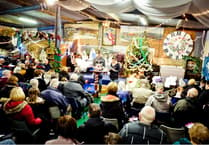Bay Festival founders Jonathan and Jamie Irving have lost their appeal over a rejected multi-million pounds negligence claim against an island advocate.
A 43-page judgment by the appeal court could prove to be the final chapter in the father and son’s protracted legal battle over the winding up of their Street Heritage development company.
Street Heritage was wound up following a short court hearing on February 24, 2010, over an unpaid tax bill totalling £182,929.
The company’s advocate Jerry Carter did not turn up in time for the winding-up hearing.
Then government advocate Stephen Harding, who was acting for the assessor of income tax, failed to inform Deemster Doyle that a 28-day adjournment had been agreed.
Mr Carter arrived at court about 10 minutes after the hearing had ended and did not – despite being invited by the Deemster’s clerk to do so – ask the court to reconvene immediately to secure the adjournment.
The Irvings maintain that had an adjournment been put into effect, Street Heritage would have avoided liquidation, claiming it could have called on funds from other sources to pay off the debt and continued as a going concern.
But their £3.5m claim for damages against Mr Harding and other government officials was struck out in May 2011.
They went on to pursue a negligence claim for some £5m against their lawyer Mr Carter.
In a 2017 judgment, Deemster Andrew Corlett ruled that Mr Carter had been negligent in not turning up in time to adjourn the winding up application.
But in a subsequent judgment, handed down in September last year, Deemster Corlett said all the Irvings’ claims must fail because the losses were not caused by the defendant’s negligence.
He said Street Heritage had been insolvent and would have been wound up anyway within a matter of weeks or months and there was no viable rescue package available to save the situation.
The Irvings lodged an appeal against that decision, citing some dozen grounds including that Deemster Corlett had erred in law.
But the appeal court has now dismissed the appeal, after rejecting each of the grounds in turn and concluding that Deemster Corlett’s approach and findings could not be faulted.
Mr Carter has always maintained that the Irvings’ financial empire had been due to collapse in any event as Street Heritage was ‘clearly insolvent’ at the time of the presentation of the winding-up petition, with other creditors waiting in the wings.
In September 2017 Jonathan and Jamie Irving were disqualified to act as directors for a period of eight years and seven years respectively.
Mr Harding, who had been the government advocate in February 2010, but had been elevated to Attorney General in April 2011, was twice tried before a jury in the Court of General Gaol Delivery in 2013 and 2014 as a result of his alleged actions prior to the winding -up hearing but was acquitted on both occasions.
He was however found guilty of professional misconduct and reprimanded by the Advocates’ Disciplinary Tribunal in September 2010 for failing to inform the High Court that Street Heritage was legally represented and was in negotiation to reach a settlement.
The Irvings had claimed just under £5m in Street Heritage and personal losses and other damages arising out of the winding up, arguing that Mr Carter had caused or permitted the company to become insolvent.
Mr Irving senior also claimed he had lost equity on his home in Peel after losing his source of income and defaulting on his mortgage following the winding up order but no figure was given for this loss.
Specified losses included £589,381 incurred by the 2010 Isle of Man Bay Festival, which took place about four months after the winding-up order.
A further festival planned for summer 2011 had to be cancelled due to lack of confidence in the claimants caused by the winding-up of Street Heritage, giving rise to further losses of £450,000.
But in his 56-page judgment last year, Deemster Corlett ruled these claims were ‘misconceived’ as the 2010 festival had been projected to break even and one of the biggest causes for the additional losses in 2010 was the large numbers of non-ticket holders who had managed to get into the concerts.
He said the claimed losses for the cancelled 2011 festival were ‘far too remote’ to be the responsibility of Mr Carter.




